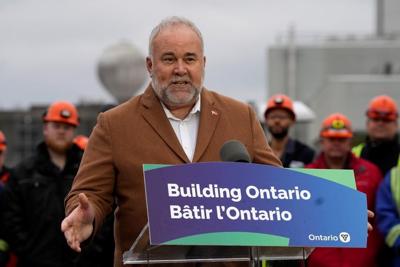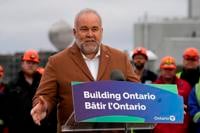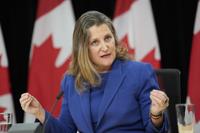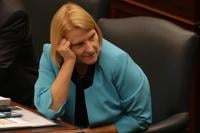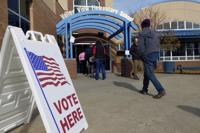TORONTO - Ontario's energy minister introduced legislation Thursday to overturn a decision on natural gas connections by the province's independent energy regulator, a move decried by environmental advocates as a setback to progress on clean energy.
The December decision by the Ontario Energy Board would increase costs for homebuyers by making them pay up front for the connection instead of seeing it amortized over 40 years, Todd Smith said.
The bill would give the province authority to reverse the OEB decision, reset the amortization period to 40 years, and enable the government to direct the regulator to conduct a separate hearing on any matter of public interest.
'The last thing we want to be doing is intervening here, but we do have the best interests of the people of Ontario in mind," Smith said.
"We want to ensure that we keep the cost of building new homes down, because we set a goal to build (1.5 million) of them over the next 10 years. The last thing we want to see is the price of new homes going up."
But environmental groups have said the decision was a huge win for the environment and Ontarians, as it would have encouraged the uptake of greener home heating and cooling such as heat pumps and actually be beneficial for consumers.
"If the Ford government overrules the Ontario Energy Board, homeowners will get stuck with higher costs and more air pollution," Keith Stewart, senior energy strategist with Greenpeace Canada, wrote in a statement.
"We should be installing the cleanest and lowest-cost options for heating and cooling new homes, even if that makes some of the Ford government's well-connected friends at Enbridge and in the property development industry unhappy."
The OEB decision relates to a rate application from Enbridge, which serves the majority of natural gas customers in the province, and Enbridge has filed a motion with the energy board asking it to reconsider its decision and has also asked the Divisional Court to set aside four key parts of the ruling.
NDP energy critic Peter Tabuns said not only is reversing the OEB decision bad climate policy, it will actually raise people's natural gas bills because Enbridge will seek to charge higher rates in order to fund its capital plans. He is worried the incursion into the OEB's independence will set a precedent.
"The regulator has said no, we're not going to allow you to charge existing customers for expansion of your system. And so the potential impact is about $300 per customer over the next four years," Tabuns said.
"(The OEB) made the decision on this particular increase looking out for us. As soon as they actually acted like a regulator, they get stepped on."
Green Party Leader Mike Schreiner said the only beneficiary of overturning the OEB decision is Enbridge.
"By trying to keep taxpayer dollars flowing to fossil fuel giants, the Ford government is costing Ontarians more," he wrote in a statement.
"Greens support the OEB’s decision designed to help Ontarians get off fossil fuels and make the switch to cleaner, cheaper energy alternatives."
The energy board ruled that Enbridge's long-term plan is unreasonable because it assumes that every new housing development will include gas servicing and that homebuyers will remain on gas for 40 years, despite an energy transition toward electrification being underway.
Amortizing the cost of a natural gas connection over 40 years for customers will leave a large stranded asset risk as some customers inevitably get off natural gas, and that's a cost that would be paid by future ratepayers, the decision said.
Instead, the OEB said the connection cost, which Enbridge estimated at about $4,400, should be paid up front by home developers to address that risk and incentivize developers "to choose the most cost-effective, energy-efficient choice."
Enbridge said in its notice of appeal that the OEB has historically directed it to use 40 years and erred in law by "rendering a decision in the absence of any evidence considering the effect of a 0 year revenue horizon and with no evidence that any other jurisdiction has adopted this approach."
The OEB heard submissions from a large number of groups and heard suggestions to lower that 40-year amortization period to either 30, 20, 15 or zero years. The zero years idea – meaning the total cost of gas servicing is paid up front – largely came from two environmental groups.
Smith said the legislation will also require the OEB to conduct "broader engagement." The bill would allow the government to require the OEB to notify and invite participation or testimony from specific groups that could be affected by an upcoming decision or hearing.
"(In this case), they didn't hear from the system operator ... to determine whether or not we were going to have the electricity that we needed, they didn't hear from homebuilders, about what the impact would be on a new home, and they didn't hear from construction companies as well," he said. "So it's really important that we have the proper people at the table."
The role of chair of the OEB is currently vacant and the government said in a press release that it will soon appoint someone "with the expectation that the board and commissioners conducts appropriate consultation – in line with the proposed legislative requirements – before reaching decisions that support the objective of an affordable, reliable, and clean energy system."
This report by Ďă¸ŰÁůşĎ˛ĘąŇĹĆ×ĘÁĎ was first published Feb. 22, 2024.

